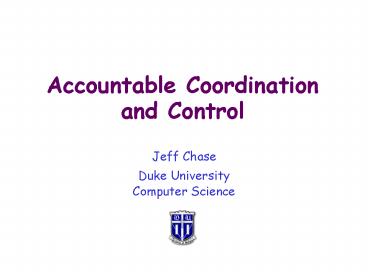Accountable Coordination and Control - PowerPoint PPT Presentation
1 / 12
Title: Accountable Coordination and Control
1
Accountable Coordination and Control
- Jeff Chase
- Duke University
- Computer Science
2
Grand Challenges?
- Distributed, adaptive infrastructure control
- Control systems for electrical system, traffic,
etc. - Enterprise information systems / workflow
- Medicine Wallach, e-science Welsh
- Commerce and finance
- Supply chain, brokering/trading
- Government
- Control of systems we understand and own
- Internet control plane
- Network utilities / Grid
3
Still a Challenge
- Use IT and distributed systems technology to
manage real-world systems betteror greener
Carla. - Shared
- Federated
- Local autonomy local sensors and local control
- Decentralized/delegated power and authority
- Global coordination
- It really matters when things go wrong.
- Failure of the enterprise
- Sanctions and liability legal, financial,
political
4
Some Worthy Challenges
- Pervasive instrumentation / sensors
- Dynamic, decentralized control/adaptation
- Reliable and secure service from unreliable and
insecure components. - Autonomic, self-diagnosing, self-healing
- This talk accountability is a fundamental
requirement with a fundamental impact on the
structure of these systems.
5
Incentives are Paramount
- P2P massive scale, anonymous participants,
randomized dispersion of functions and roles. - What have we learned?
- Complex systems are federated.
- Any federated system is a game.
- Self-interested actors
- Local choices, emergent global behavior
- Primacy of incentive/mechanism
- Recognize and reward faithfulness and punish
disruptive, faulty, or anti-social behavior.
6
The Social Contract
- Participants obtain benefits from membership in a
collective or community. - Well-structured communities are self-sustaining
- Bottom-up growth and evolution / interconnection
- Membership entails rights and obligations.
- Negotiated roles rather than random assignment
- Control networks and enterprises are at modest
scale. - Low churn
- Strong identity is possible.
7
Vulnerabilities and Defenses
- Security trust establishment, integrity of
communications - Extend the secure perimeterif you have one.
- Authorization useful for rights, but not
obligations - BFT all actors are vulnerable to attack and
subversion - May manifest as a fault or disruptive behavior
- But BFT is not enough tyranny of majority, must
deal with strategic/rational behavior Alvisi,
Dahlin - Accountability issues compliance with the
contract, faithfulness to assigned roles,
self-consistent behavior, correctness and
effectiveness of action within the community.
8
Accountability
- What did he know and when did he know it.
- There were failures at all levels of
government. - We must know who did what to whom when.
- Maintain secure history of states and actions
Shrira - Non-repudiability of history
- Prevent actors from misrepresenting the claims or
actions of themselves or other actors. - Assign responsibility for failures, and prove it
- Auditing
- Trust but verify.
9
Some Challenges
- Transitive integrity in communication protocols
- Recording and maintaining tamper-evident history
- How to prove the absence of actions?
- Reasoning about action history and causality
- Supplement protocols to permit peers to verify
self-consistent behavior and faithfulness. - Auditing or consistency checking by other actors
against previous actions or states.
10
Framing?
- Negative security framing applies
- Catch problems early and limit the damage
- Learn from history avoid repeating disasters
- Build distributed service infrastructures that
promote safe cooperation/coordination. - Overcome fear that discourages coordination
- Sustainable distributed systems
- Enable accountable institutions
- E.g., Assure data quality for distributed
information sharing, e.g., in exchange of medical
records or scientific data.
11
Problems/thoughts
- Devise practical techniques that enable an actor
to prove that a claim or action is justified by
its certified inputs according to accepted rules. - E.g., a router cannot advertise a path upstream
unless it can show that the path is legitimate
given advertisements received from its downstream
neighbors. - Transitively unwind actions and beliefs resulting
from claims and directives by an actor
subsequently discovered to be faulty. - Are there common state representations and
protocols that transfer to a wide range of
services, i.e., toolkits to facilitate
construction of accountable systems? - What is the role of non-repudiable messaging and
accountability in systems that involve
contractual arrangements? - What are the limits to services built without
trust, relative to services that embody trust but
whose behavior is audited to validate it against
expected semantics? - How can we reconcile accountability with privacy?
12
http//www.cs.duke.edu/chase































